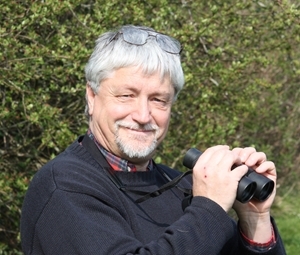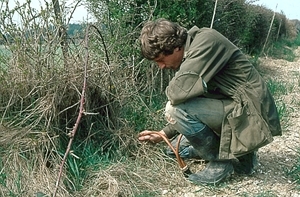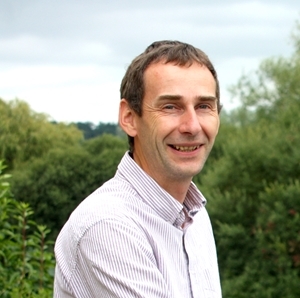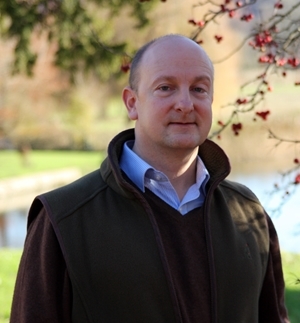 After 44 years with the Game & Wildlife Conservation Trust, Director of Research, Advisory and Education, Professor Nick Sotherton, is retiring this week (30 June 2020). Professor Sotherton has been with the Hampshire-based conservation charity since joining to study for his PhD in 1976. He has been Director of Research since 1998 and in 2015 he took on the additional role of Director of Advisory and Education.
After 44 years with the Game & Wildlife Conservation Trust, Director of Research, Advisory and Education, Professor Nick Sotherton, is retiring this week (30 June 2020). Professor Sotherton has been with the Hampshire-based conservation charity since joining to study for his PhD in 1976. He has been Director of Research since 1998 and in 2015 he took on the additional role of Director of Advisory and Education.
GWCT Chief Executive Teresa Dent CBE said: “We will miss Nick enormously and the GWCT owes him a great deal. Nick has been a driving force at the Trust and in the field of agricultural science, especially on farmland, throughout his career. Many of his innovations have been agri-environment prescriptions from the start of those schemes, such as beetle banks, and are now seen across the country. This is the end of an era for us.”
Reflecting on his time with the GWCT, Professor Sotherton said: “Almost from day one, I was told that the organisation was about ‘turning words into birds’, and 40 years on, this motto is still the driving force behind what we are and what we do. Our research needs to have an impact on the ground. On the back of quality research, we provide an evidence base for those making management decisions over large tracts of land, be they farmers or policy makers. I have been proud to lead a team of talented scientists and advisors, committed to wildlife conservation in our countryside.”
In response to Professor Sotherton’s retirement, Mark Tufnell, Deputy President of the Country Land and Business Association (CLA), said: “Nick will be a hard act to follow. He has had a tremendous career with the Trust and so many achievements. He has inspired many of us to become conservationists.”
Liam Stokes, Chief Executive of the British Game Alliance, said: “I am very sad to see Nick go. He gave a number of inspiring talks to our gamekeeping and our conservation students at Lackham, and I remember his provocative address to our conservation students in particular, challenging them to think about their approach to game and wildlife management as conservationists. He leaves behind a tremendous legacy of research.”
Following Professor Sotherton’s retirement, the role of Director of Research, Advisory and Education is being split. The GWCT’s current Head of Wetland Research, Dr Andrew Hoodless, will become Interim Director of Research, and Dr Roger Draycott, the Trust’s Head of Advisory, will take on the role of Interim Director of Advisory & Education. More details on these appointments are below.
Professor Nick Sotherton – a lasting legacy across Britain’s countryside
 An early interest in zoology, fostered through family trips to the Natural History Museum, led London-born Nick to pursue his instinctive leaning towards applied science. “As a child I was fascinated by the shiny black beetles in our suburban garden. As this interest developed, I knew I wanted to do applied science: work with a useful end point rather than only academically useful.”
An early interest in zoology, fostered through family trips to the Natural History Museum, led London-born Nick to pursue his instinctive leaning towards applied science. “As a child I was fascinated by the shiny black beetles in our suburban garden. As this interest developed, I knew I wanted to do applied science: work with a useful end point rather than only academically useful.”
A first-class honours degree in Agricultural Zoology at Newcastle University followed and, in 1976, Nick joined the GWCT, or Game Conservancy as it was then, as its very first PhD student. Under the mentorship of the Director of Research, Dr Dick Potts, Nick studied the ecology of beetles in cereal fields and the effects of agricultural practices on their population dynamics. His PhD from the University of Southampton was awarded in 1980.
After post-doctoral research into cereal aphids at Reading University, Nick returned to the Game Conservancy to work with Dick Potts on establishing the value of hedgerows and field margins as habitats for overwintering predatory insects and spiders.
In the mid-1980s, Nick began work on the increasing problem of poor survival rates of gamebird chicks. Dick Potts believed the decline was associated with the intensification of agricultural practices, particularly the spraying of herbicides that killed off the weeds which were home to the insects that gamebird chicks fed on. This work became the Game Conservancy Trust’s highly influential Cereals and Gamebirds Project. During the project Nick, along with the trust’s longstanding Vice Chairman Hugh Oliver-Bellasis, established a farm-scale trial at the Manydown estate in Hampshire, and raised over £2.5 million needed to expand the scheme nationally.
The scheme provided farmers with practical management plans for conserving gamebirds and other wildlife on arable farms, without compromising standards of cereal grain production, as well as offering alternatives to reliance on pesticides by encouraging valuable predatory insects which can help to prevent aphid pest outbreaks. Nick helped invent both ‘beetle banks’ (raised strips of perennial grasses, situated strategically across arable fields, where predatory insects and spiders can overwinter before helping to control crop pests in spring) and ‘conservation headlands’ (the selective spraying of crops). The Cereals and Gamebirds Project is widely acknowledged to have transformed cereal production and wildlife conservation. Integrated pest management, crop management and farm management became widespread and the role of beneficial insects was recognised and taken seriously.
In 1990 Nick became Head of Farmland Ecology, where he developed further influential agri-environment measures such as wild bird cover crops to provide winter food for farmland birds. He ran the Lowlands team as Research Director before taking on the role of Director of Research in 1998, leading a team of 60 scientists. Since 2015 Nick has combined this demanding role with being Director of Advisory & Education. His research interests in recent years have included farmland ecology, sub-lethal impacts of pesticides on non-target species, and the mitigation of the impacts of intensive agriculture on the environment.
Nick’s contribution to agricultural science was recognised in 2005 with the award of the RASE Research Medal. In 2010 he was appointed Honorary Visiting Professor in the Centre for Rural Policy Research at the School of Humanities and Social Sciences and the School of Biosciences at the University of Exeter. Since then he has lectured in 20 universities and colleges around the UK, mainly to MSc students studying natural sciences. He is proud of the GWCT’s commitment to nurturing scientists.
“We are about to see the 100th GWCT PhD successfully defended,” comments Nick. “A remarkable milestone from the first GWCT PhD in 1980 by someone called Sotherton.”
Nick remains committed to using the conservation science carried out by the GWCT to develop game and wildlife management techniques and provide training and advice to land managers to improve the biodiversity of Britain’s countryside.
New appointments at the GWCT
 Following Professor Sotherton’s retirement, Dr Andrew Hoodless will become Interim Director of Research. Andrew has been the GWCT’s Head of Wetland Research since 2010. He joined the Game Conservancy Trust in the early 1990s, when the Trust sponsored his PhD on woodcock. Since then he has worked in the Uplands and Lowlands research teams, on black grouse and capercaillie projects in Scotland, the Upland Predation Experiment in Northumberland, and work to quantify the effects of gamebird releasing on woodland wildlife. He initiated the first national survey of breeding woodcock in 2003 and, as Head of Wetland Research, he has worked on woodcock migration, assessing the effectiveness of agri-environment measures for lapwings, reversing wader declines in the Avon Valley and on links between breeding and winter habitats for curlew, lapwing and oystercatcher using GPS tracking.
Following Professor Sotherton’s retirement, Dr Andrew Hoodless will become Interim Director of Research. Andrew has been the GWCT’s Head of Wetland Research since 2010. He joined the Game Conservancy Trust in the early 1990s, when the Trust sponsored his PhD on woodcock. Since then he has worked in the Uplands and Lowlands research teams, on black grouse and capercaillie projects in Scotland, the Upland Predation Experiment in Northumberland, and work to quantify the effects of gamebird releasing on woodland wildlife. He initiated the first national survey of breeding woodcock in 2003 and, as Head of Wetland Research, he has worked on woodcock migration, assessing the effectiveness of agri-environment measures for lapwings, reversing wader declines in the Avon Valley and on links between breeding and winter habitats for curlew, lapwing and oystercatcher using GPS tracking.
On his new appointment, Dr Hoodless commented: “I strongly believe in the importance of science to inform conservation management. Using research to provide policy makers and practitioners with solutions to conservation issues is at the core of what the GWCT does. The breadth of knowledge and expertise on game and wildlife within the GWCT’s research department is unique and I am grateful for the opportunity to lead such a motivated team.”
 Dr Roger Draycott will take on the role of Interim Director of Advisory and Education. From a farming background and with a PhD in pheasant ecology, Roger has worked at the GWCT since 1993.
Dr Roger Draycott will take on the role of Interim Director of Advisory and Education. From a farming background and with a PhD in pheasant ecology, Roger has worked at the GWCT since 1993.
He commented: “I spent many years studying and quantifying the effects of game management on wildlife and habitats and have spent recent years working with farmers and game managers to maximise the conservation benefits that good game and wildlife management can deliver. I’m delighted to be able to continue and expand this programme of work in my new role as Director of Advisory and Education.”
Notes to editors
The Game & Wildlife Conservation Trust – providing research-led conservation for a thriving countryside. The GWCT is an independent wildlife conservation charity which has carried out scientific research into Britain’s game and wildlife since the 1930s. We advise farmers and landowners on improving wildlife habitats. We employ more than 60 post-doctoral scientists and other research staff with expertise in areas such as birds, insects, mammals, farming, fish and statistics. We undertake our own research as well as projects funded by contract and grant-aid from government and private bodies.
For information, contact:
Eleanor Williams
Telephone: 07592 025476
Email: press@gwct.org.uk